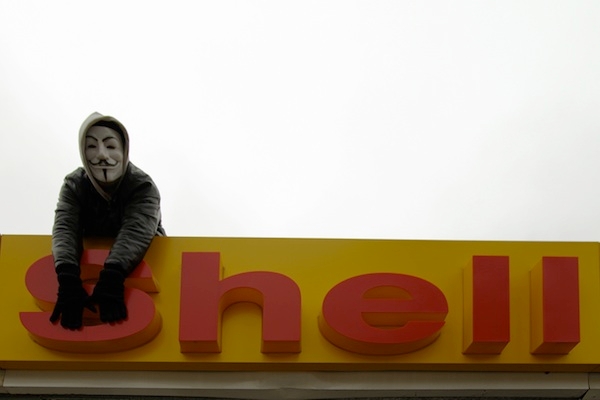At the Spectator party this year I met a girl I hadn’t seen since Oxford. We exchanged pleasantries. She was looking good and she’d done really well for herself, which made me very happy for her. But then she mentioned that before her latest plum posting she’d been working in the ‘private sector’ for Shell. I said: ‘I hardly call Shell the private sector.’ And the conversation went downhill from there.
When I was a child I used to love Shell. We’d never fill our tank anywhere else, if we could help it, because the Shell garages used to give you these brilliant collectable medallions — such as their 1969 Man in Space set — which you stuck into a cardboard display case and raced to complete before your friends.
Later, I may have had one or two shares in Shell which I think did quite well. But I’d never buy shares in Shell, now for the same reason I’d never buy shares in, say, the wind company Vestas (well, not except to short them) or one that sold torture equipment to Third World dictatorships or ultra-high-interest loans to the mentally ill.
For me, disillusionment set in in the aftermath of the 1995 Brent Spar furore. You’ll remember the story: Shell wanted to dispose of an old oil storage buoy by sinking it in the middle of the Atlantic. Greenpeace objected wildly to this scheme on ecological grounds and launched a very successful Europe-wide boycott of Shell’s petrol stations. Shell caved and agreed to have the buoy towed to shore and broken up there instead.
But the much more interesting part is the one you don’t remember: the bit where Greenpeace was later forced to apologise for having grossly overstated the environmental risks of Shell’s scheme. In fact Shell’s original policy had been the most sensible, not just financially, but also environmentally since the buoy would soon have transformed itself into a marine wildlife habitat.
Brent Spar was a disaster for Shell’s image but it should have been a much bigger one for Greenpeace’s. Here was a perfect opportunity for Shell to ram home the point that Greenpeace (as its co-founder Patrick Moore has noted) has rather less these days to do with saving the environment than it does with destroying capitalism.
Unfortunately, Shell’s take-home message from Brent Spar has been the exact opposite: that oil is dirty and capitulation is the only option. I don’t know how much money, if any, it has pumped directly into Greenpeace’s coffers. But in its former sponsorship, for example, of the Guardian’s environment pages and of the World Wildlife Fund it has done the equivalent of paying Danegeld to some of its most implacable ideological enemies.
Though climate sceptics are often accused of being in the pay of Big Oil, the truth is that Big Oil (Shell certainly; and ‘Beyond Petroleum’ too) has been far too busy trying to greenwash its image on the climate change gravy train to bother with any of that old-fashioned nonsense like defending free markets, concentrating on core business or speaking up for truth and integrity.
Maybe there was a time, 15 or 20 years ago, at the peak of the ‘Man Made Global Warming’ scare when it was a tenable position to accept IPCC’s so-called ‘consensus’ and plan your strategies accordingly. But since then an awful lot has changed: Climategate and books like Donna Laframboise’s The Delinquent Teenager Who Was Mistaken For The World’s Top Climate Expert have driven a coach and horses through the IPCC’s claims to credibility; the public is significantly less credulous of green folderol; and the global economy has tanked, for reasons at least partly connected to the over-regulation and artificially inflated energy prices brought about by the propagandising of green pressure groups.
At times like this, the capitalist system needs all the help it can get. If the notion catches hold that free markets have failed and that the only solution is more state intervention, then there will be no global economic recovery. So it matters that corporations of Shell’s stature and influence should take a stand for low regulation and free trade. Not only is it right morally — because of all those people it will help lift out of poverty — but it’s also the right thing for Shell’s shareholders, whose stocks will inevitably rise with the tide of a burgeoning world economy.
But Shell is not doing the right thing. It has serious questions to answer about its presence at the recent Downing Street meeting on shale gas from which the Energy Secretary was able — mysteriously — to draw the conclusion that Britain’s abundant shale gas reserves were smaller and less viable than previously thought. And even more serious ones to answer about its enthusiastic role in the international carbon-trading racket.
‘It’s about the bottom line,’ my old Oxford friend insisted. Yes, well, the arms trade can be pretty profitable too. So by that token, presumably, Shell would be seriously missing a trick if it didn’t branch out into manufacturing land mines and daisycutter bombs? Of course I understand that the business of business is business. But unless it creates value and delivers something that consumers actually want, it’s not real business at all but rent-seeking: a conspiracy — stitched up with government regulation — against the public.
As the excellent Australian blogger Jo Nova has noted, last year the global carbon trading market hit $176 billion — about the same as global wheat production. Who is paying for what Jo rightly calls ‘a trading scheme we don’t need to solve a problem for which there is no supporting evidence’? We are, of course. Maybe, on second thoughts, I should buy some Shell shares after all. Then I could bring it up at the next shareholder meeting.







Comments